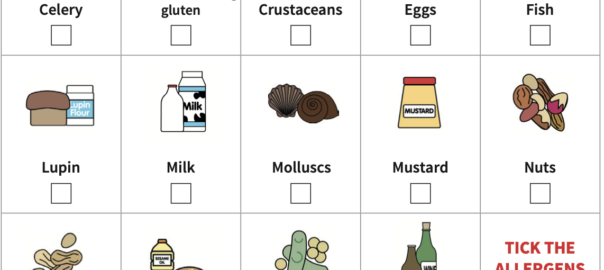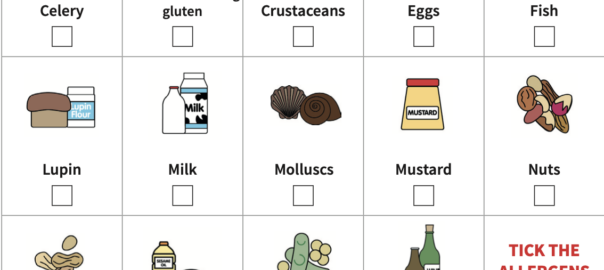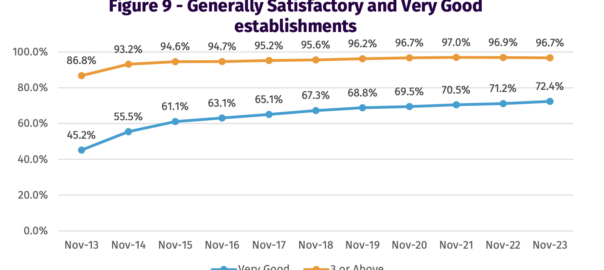Here is the link to the recent BBC Breakfast article on Food Hygiene inspections including interviews with FSA’s Emily Miles and Katie Pettifer.


Here is the link to the recent BBC Breakfast article on Food Hygiene inspections including interviews with FSA’s Emily Miles and Katie Pettifer.

The proportion of business achieving FHRS-5 continues to grow. Data up to the end of 2023 now shows this has reached 76.1%.
Now that a new Government is in place, here’s hoping FSA will be provided with a legislative slot to enable them to start the process of introducing compulsory display of stickers in England.

FSA Chief Executive resigns. Emily Miles has announced that she will be moving on to be the new Director General of Food, Biosecurity and Trade at Defra.
In the meantime the current Director of Strategy, Katie Pettifer will be appointed as interim CX whilst a replacement is being recuited.

FSA Chair to stay after all. Susan Jebb’s appointment has been temporarily extended to allow her to go through the process to stay on for a while longer. Congratulations Susan – maybe as part of the deal you can get them to timetable the required legislation for compulsory display of FHRS stickers?

Download food poisoning epidemic reported.
Two vendors were closed down at the recent Download festival after “hundreds” of music fans were struck down by food poisoning. Event organiser Live Nation shut the stalls after it was reported that hundreds of people had been affected by the illness, with some having to use buckets as makeshift toilets.
Unfortunate that the promoter of the event was called Liquid Death.
Anecdotal evidence from the medical tent was that as many as 500 people were affected in a “real food poisoning epidemic”. A performer said he had had to go to hospital for treatment.
At events like this it shows just how easy a small slip in Food Hygiene standards can affect hundreds. Many vendors at such events voluntarily display their FHRS rating sticker. For those about to attend Glastonbury and other festivals this summer, buying only from those displaying a 5 rating is your best way of ensuring that the vendors have proper procedures in place to prevent this.

New WTO report highlights key issues associated with food fraud. The key findings from the report are:
International trade has helped to reduce global hunger, but food fraud is a growing problem
Illicit trade in food and food fraud inflict considerable damage to international trade and public health
Illicit trade in food undermines global food security and agri-food value chains
The WTO rulebook brings a legal framework to international trade in food, helping to combat illicit trade
Reducing import and export restrictions could diminish incentives for smuggling and illicit trade in food
Modern food safety legislation can minimize the potential for fraudsters to exploit gaps in the food supply chain
Timely, thorough investigations can disrupt illicit trade in food and food fraud
Public–private collaboration and international cooperation can help to combat illicit trade in food
Download the full report for free here

Free Allergy Guide – an excellent new guide from Public Sector Catering on Allergy handling.
All food businesses have a legal requirement to sell safe food and need to make customers aware of any food provided that contains or may contain any of the 14 listed food allergens.
The Food Standards Agency are committed to introducing legislation – known as Owen’s Law – to require written information on Allergens to be provided to all consumers. If you don’t already have robust policies in place, this easy-to-read guide will help you quickly protect the safety and well-being of your customers.
Download free here

New FSA study highlights nuts as the main cause of allergic reaction.
The study shows that more than 30% of adults reported having food hypersensitivity. However when this was investigated further through a clinical assessment, it was found that only 6% of the UK adult population have a clinically confirmed food allergy.
It found that:
1. Foods such as peanuts and tree nuts like hazelnuts, walnuts and almonds, are most likely to cause an allergic reaction
2. Many individuals also had allergies to fresh fruits such as apple, peach and kiwi frui. These are associated with allergies to birch pollen, also known as pollen-food allergy syndrome or oral allergy syndrome
3. Other foods currently on the allergy schedule such as soybean, celery, mustard, fish, shellfish and lupin, rarely caused IgE*-mediated food allergy
*IgE is a type of antibody in your immune system. It leads to quick reactions in the body after eating food, usually after a few minutes. Small quantities of food protein bind to IgE receptors in the body. This causes inflammatory chemicals to release, leading to a reaction.

$41.7M. The largest ever fine for ignoring food hygiene laws was imposed upon Family Dollar for allowing rodents to roam free in their warehouse.
Presence of rats is about the most serious transgression of food hygiene laws and one which will usually guarantee your business will be closed.
Full article here

A recent review* of the operation of the FHRS in Wales has produced a recommendation to work towards mandatory on-line display:
“The FSA recognises the opportunity for stakeholders to work together to develop proposals to extend the scope of the statutory FHRS that will aim to introduce legislation in Wales that makes it mandatory for food business operators to display their food hygiene rating online.”
*Review of the Implementation and Operation of the Statutory Food Hygiene Rating Scheme in Wales, February 2024